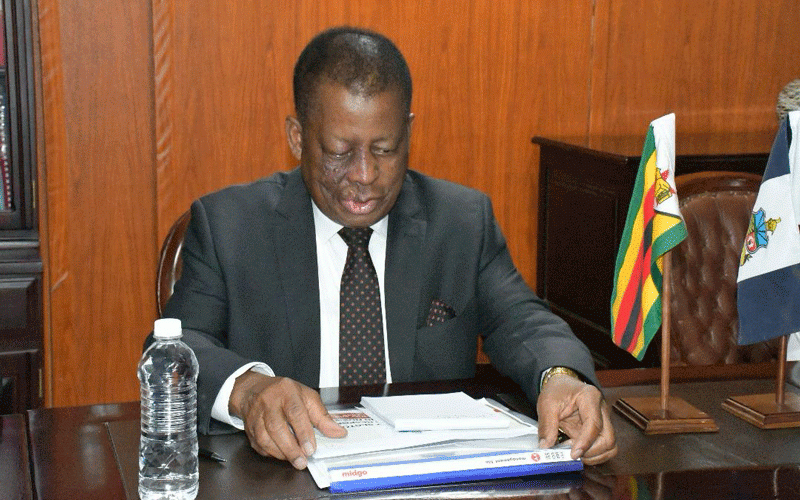
BY JAIROS SAUNYAMA
For months, award-winning Zimbabwean journalist Problem Masau has been working from home since the Covid-19 lockdown measure were introduced in March.
Having been operating at the Media Centre in Harare’s city centre before disaster struck, Masau had to adopt latest technological strategies to stay afloat and execute his duties in the wake of the global pandemic that has resulted in millions being affected.
“The country is under lockdown and Covid 19 is real hence I would not want to take chances. I have been working from home, thanks to ICTs, everything is smooth. I follow press conferences and do interviews on the internet. It has worked and given the current lockdown restrictions one has to embrace the fortunes of ICTs,” Masau said.
The Covid-19 pandemic came along with nationwide restrictions in movement, gatherings, introduction of quarantines and closures of educational establishments among other measures implemented to contain the virus.
The crisis gave birth to Zoom meetings while school children have been doing their work via Zoom or WhatsApp groups among other online platforms.
“This crisis has brought to the fore the importance of information and communication technology (ICT) in businesses, healthcare, education and public services.
The Covid-19 era has seen Zimbabweans embracing the digital life with activities ranging from online entertainment, increased use of real-time online broadcasts via platforms such as Facebook, Instagram and YouTube to online meetings and even Parliament sessions via platforms such as Zoom. The Ministry of Information has also been very active disseminating Covid-19 related information via online platforms and Facebook groups,” said US based ICT expert Samuel Chindaro.
- Chamisa under fire over US$120K donation
- Mavhunga puts DeMbare into Chibuku quarterfinals
- Pension funds bet on Cabora Bassa oilfields
- Councils defy govt fire tender directive
Keep Reading
Gospel musician Kudzai Nyakudya said ICTs ensured that “life goes on” without much physical meetings. A number of musicians have been conducting live perfomances via online platforms and televisions thereby providing entertainment to the citizens. The provision of entertainment helped in ensuring that citizens had something to enjoy during the lockdown thereby minimising movements of people.
Chindaro added that ICTS ensured the continuity of general life.
“It is evident that the Covid-19 era has seen the world-wide use of technology on an unprecedented scale to keep people safe, as well as to ensure continuity of general life, education and businesses. As the world continues to fight Covid-19 the role of ICT to enhance disease surveillance, coordinate response mechanisms, and promote public awareness has become more significant,” Chindaro said.
However, some Zimbabweans have been abusing ICTs through posting fake news about Covid 19 thereby causing alarm and disorder.
In a bid to counter the abuse, government formulated laws to deal with pepetrators through Statutory Instrument (SI) 83 of 2020 that regulated misinformation on the Covid-19 issues. According to the law, a person convicted of spreading fake news on Covid-19 will “pay a fine up to or exceeding level fourteen or imprisonment for a period not exceeding 20 years or both.”
“For the avoidance of doubt, any person who publishes or communicates false news about any public officer involved with enforcing or implementing the national lockdown in his or her capacity as such, or about any private individual that has the effect of prejudicing the state’s enforcement of the national lockdown, shall be liable for prosecution under section 31 of the Criminal Law Code and liable to the penalty there provided, that is to say a fine up to or exceeding level 14 or imprisonment for a period not exceeding 20 years or both,” the regulations read in part.
Since the proclamation of the law, authorities have arrested only a single person whose matter is yet to be concluded in the courts of law.
The accused, Lovemore Zvokusekwa (36) is facing charges of publishing or communicating falsehoods prejudicial to the State. The fake statement was circulated on social media platforms when the country was still in its initial 21-day lockdown period.
According to court papers, Zvokusekwa published a false press statement document purporting it had been issued by Mnangagwa under the headline, Extension Lockdown Period By 13 Days Only.
According to a communiqué by the Media Institute of Southern Africa (Misa), the SI is meant to benefit the reputation of those working on behalf of government to manage the virus.
“However, an important point of departure between the Zimbabwean law and the misinformation laws from other countries, is that the provisions of Section 14 of SI 83/2020 are aimed at protecting the reputations of individuals who work on behalf of the State to manage this virus in Zimbabwe,” reads the Misa communiqué.
“The wording of this provision makes it less about actually reducing the spread of inaccurate information about the virus and more about restricting free expression and fair comment about the State actors involved in the fight against Covid-19,” read the communiqué.
According to experts, even though government identified ICTs as a vital catalyst for economic development; it has not followed this up with effective implementation and establishment of the infrastructure to enable this to bear fruit; especially in this pandemic era.
Today, Masau can testify to the goodness of ICTs during times of disaster like these. A number of students have been conducting their lesson online while a lot have been entertained via social media platforms.











